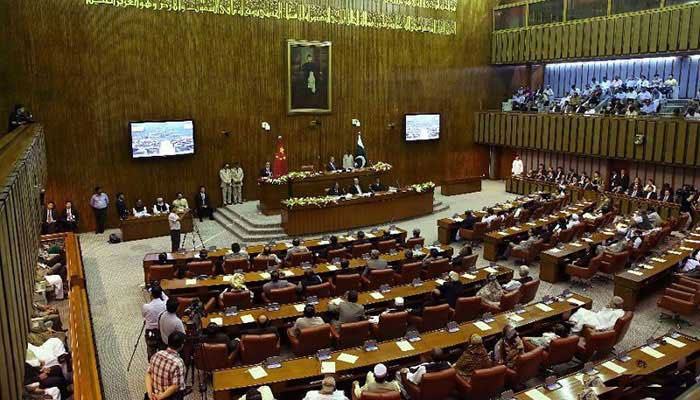Senate wants better salaries for lower grade employees
The Senate unanimously adopted majority of recommendations that the percentage salary increase of government employees in grade 1 to 16 should be greater than those in higher grades with a view to dealing with disparity in relief
ISLAMABAD: The Senate on Thursday unanimously adopted majority of recommendations of the House panel on finance and economic affairs and told the National Assembly that the percentage salary increase of government employees in grade 1 to 16 should be greater than those in higher grades with a view to dealing with disparity in relief.
Senate Standing Committee on Finance, Revenue and Economic Affairs Chairman Saleem Mandviwala of the PPP presented a report on the Finance Bill 2022 that was adopted by the House.
These recommendations will be transmitted to the National Assembly for consideration and incorporation into the budget. The House recommended immediate withdrawal of 17% Sales Tax on purchase of pharmaceutical raw material, including active pharmaceutical ingredients (APIs) and provision of a negative list to eliminate misuse of such raw materials.
The Senate recommended to the NA that the import of aircraft and their parts be exempted from Sales Tax as this tax was neither recoverable nor adjustable. The House also recommended that Sales Tax deposited by pharmaceutical manufacturers since January 15, 2022 amounting to over Rs40 billion be immediately refunded without any conditions. The House recommended consideration that credits should be allowed to businesses and taxpayers engaged in the information technology sector.
Winding up the budget debate, Minister of State for Finance and Revenue Dr Aisha Ghaus Pasha came down hard on the PTI government for what she alleged hoodwinking the people over the IMF deal and related matters.
The PTI government, she pointed out, had given a commitment to the IMF for an increase in fuel prices and tax reforms, stressing that a mature and responsible state had to honour commitments made with the international community, whereas it acted to the contrary. She maintained that the incumbent government inherited a fragile economy that was on the verge of default, coupled with widening trade and budget deficit, where the foreign exchange reserves reached the lowest level.
Moreover, she continued, the rising inflation, increasing petroleum prices and rising circular debt with long hours power outages were the other issues which required immediate attention. She said the PTI government slashed the Public Sector Development Programme that slowed down the infrastructure development work in the country. Despite fiscal constraints and tough conditions agreed with the IMF by the PTI government, the incumbent coalition government presented a balanced budget and announced measures to protect the vulnerable segments of the society. Under the prevailing circumstances, the government presented a balanced budget, besides honouring international commitments for bringing stabilisation to the national economy.
The minister claimed the previous government had agreed to tough IMF conditions while the incumbent government announced various measures for economic stabilisation, infrastructure development and protection of under-privileged segments of the society to attain an inclusive growth. She said that to protect the vulnerable and lower income people earning monthly less than Rs40,000, the government introduced a relief package and provided Rs 2,000 to each person, besides providing targeted subsidies on other essential food commodities. She assured the House that the recommendations thrashed out by the Senate finance committee would be duly considered for incorporation into the final budget document. She said the government had announced ensuring provision of essential commodities at subsidised rates as it was providing five major essential goods including flour, ghee, sugar and pulses at controlled rates to facilitate them. The budget session was prorogued sine die afterwards.
-
 Sweden's Princess Sofia Explains Why She Was Named In Epstein Files
Sweden's Princess Sofia Explains Why She Was Named In Epstein Files -
 Activist Shocks Fellow Conservatives: 'Bad Bunny Is Winner'
Activist Shocks Fellow Conservatives: 'Bad Bunny Is Winner' -
 Noel Gallagher Challenges Critics Of Award Win To Face Him In Person
Noel Gallagher Challenges Critics Of Award Win To Face Him In Person -
 Minnesota Man Charged After $350m IRS Tax Scam Exposed
Minnesota Man Charged After $350m IRS Tax Scam Exposed -
 Meghan Markle 'terrified' Over Possible UK Return
Meghan Markle 'terrified' Over Possible UK Return -
 Did Opiate Restrictions Lead To Blake Garrett's Death?
Did Opiate Restrictions Lead To Blake Garrett's Death? -
 Royal Expert Reflects On Princess Eugenie, Beatrice 'priorities' Amid Strained Relationship With Sarah, Andrew
Royal Expert Reflects On Princess Eugenie, Beatrice 'priorities' Amid Strained Relationship With Sarah, Andrew -
 Prince William's 'concerning' Statement About Andrew Is Not Enough?
Prince William's 'concerning' Statement About Andrew Is Not Enough? -
 50 Cent Gets Called Out Over Using Slur For Cardi B
50 Cent Gets Called Out Over Using Slur For Cardi B -
 Scientists Discover Rare Form Of 'magnets' That Might Surprise You
Scientists Discover Rare Form Of 'magnets' That Might Surprise You -
 Nancy Guthrie’s Kidnapper Will Be Caught Soon: Here’s Why
Nancy Guthrie’s Kidnapper Will Be Caught Soon: Here’s Why -
 AI Innovation Could Make Trade Secrets More Valuable Than Patents, Says Billionaire Investor
AI Innovation Could Make Trade Secrets More Valuable Than Patents, Says Billionaire Investor -
 King Charles Heckling: Calls For 10 BAFTAs And A Knighthood For Sign Language Interpreter
King Charles Heckling: Calls For 10 BAFTAs And A Knighthood For Sign Language Interpreter -
 Royal Expert On Andrew, Sarah Ferguson’s ‘entitled’ Behaviour Since Marriage
Royal Expert On Andrew, Sarah Ferguson’s ‘entitled’ Behaviour Since Marriage -
 Kim Kardashian Leaves Meghan Markle 'upset' With Latest 'cheap Shot'
Kim Kardashian Leaves Meghan Markle 'upset' With Latest 'cheap Shot' -
 Instagram And YouTube Accused Of Engineering Addiction In Children’s Brains
Instagram And YouTube Accused Of Engineering Addiction In Children’s Brains




